
Surya Bahadur Thapa was the only Nepali politician a five-time Prime Minister of Nepal. He served under three different kings in a political career lasting more than 50 years.

The Anglo-Nepalese War, also known as the Gorkha War, was fought between the Gorkhali army of the Kingdom of Nepal and the British forces of the East India Company. Both sides had ambitious expansion plans for the mountainous north of the Indian subcontinent. The war ended with the signing of the Treaty of Sugauli in 1816 AD, which ceded some Nepalese controlled territory to the EIC.

The Magar, also spelled as Mangar, and Mongar, are the third largest ethnolinguistic groups of Nepal representing 7.1% of Nepal's total population according to the Nepal census of 2011.

The Communist Party of Nepal , abbreviated CPN (UC–M) was an underground communist party in Nepal. The CPN (UC–M) was formed in 2002 through the merger of Communist Party of Nepal and Communist Party of Nepal (Masal).
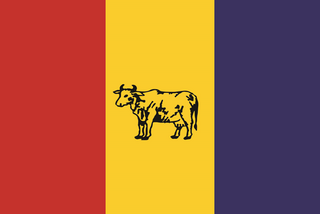
The Rastriya Prajatantra Party [Nepali pronunciation: [rasʈrijʌ prʌˈd͡zatʌntrʌ ˈpa(r)ʈi]) is a monarchist and Hindu nationalist political party in Nepal. It was formed by former prime ministers Surya Bahadur Thapa and Lokendra Bahadur Chand, who served two terms each since the end of the Rastriya Panchayat.
Nepal Samata Party is a political party in Nepal. The party is registered with the Election Commission of Nepal ahead of the 2008 Constituent Assembly election. It was led by Narayan Singh Pun, but after Pun's death the chairmanship has been taken over by Pasang Goparma Sharma. Moti Prasad Rana Magar is the general secretary of the party.
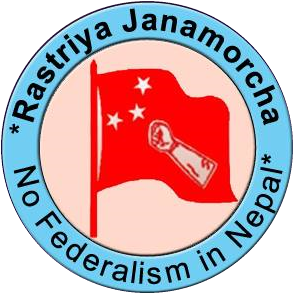
Rastriya Janamorcha is a communist political party in Nepal. It was originally founded in 1995 as the legal front of Communist Party of Nepal (Masal). It was refounded again in 2006 after breaking away from Janamorcha Nepal and has acted as the legal front for the Mohan Bikram Singh led Communist Party of Nepal (Masal).
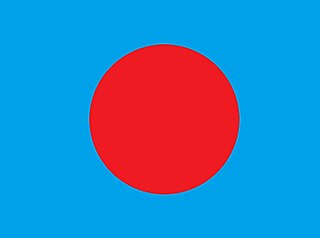
Rastriya Janamukti Partry is a political party in Nepal. The party was founded on 6 May 1990 as Nepal Rastriya Janamukti Morcha. After unification with Rastriya Jana Party on 20 January 1992, the unified party adopted the name, Rastriya Janamukti Party.
Rastriya Janashakti Party was a liberal political party in Nepal, led by former Prime Minister Surya Bahadur Thapa. Thapa had split away from the Rastriya Prajatantra Party in November 2004. The party was registered with the Election Commission of Nepal in March 2005.

Rastriya Prajatantra Party–Nepal was a Hindu right-wing, cultural conservative and royalist political party in Nepal that existed from 2006 to 2016. The party was formed as a splinter of Rastriya Prajatantra Party in 2006 and was later reunified in 2016.

Kamal Thapa served as a Deputy Prime Minister and Federal Affairs and Local Development Minister of Nepal Government. He is also current president of Nepal's royalist party, the Rastriya Prajatantra Party. He served as a Home Minister during King Gyanendra's direct rule in 2006 until the king was forced to handover power to Girija Prasad Koirala of the Nepali Congress Party and his allies with Communist Party of Nepal and Unified Communist Party of Nepal (Maoist). He and his party called for a re-establishment of the monarchy through a referendum vote. Thapa claims that no political parties in Nepal have the courage to safeguard Nepali nationality, claiming: "Now the onus lies only with the institution of monarchy to safeguard Nepali sovereignty and national unity."

Gagan Thapa is a Nepali politician and youth leader who served as the Minister of Health and Population of Nepal from 2016 to 2017. He is currently serving as a Member of Parliament in the House of Representatives, Nepal from Kathmandu since 2008, and is currently in its Parliamentary Committee on Education and Health. He is a Central Committee Member of the Nepal Congress Party.
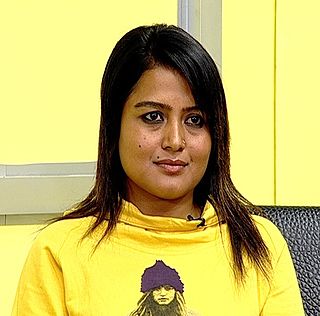
Rekha Thapa is a Nepalese film actress, model and film maker. She is one of the most popular actresses in Nepali cinema history. She was a top ten finalist for Miss Nepal in 1999. Two years later she made her movie debut in Chhabiraj Ojha's Hero. She has worked in around 200 Nepali movies and has gained popularity in the Nepali cine world because of her glamorous role. She owns the movie production house Rekha Entertainment. She won the CG Digital Film Awards for Best Actress, and in 2011 she has also won the NEFTA Film Awards for Best Actress.
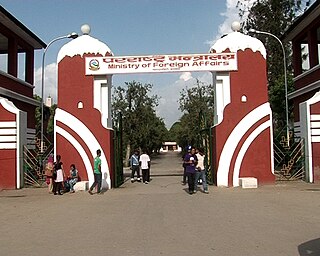
The Nepalese Ministry of Foreign Affairs abbreviated as MoFA is responsible for conducting external affairs of the Federal Democratic Republic of Nepal. Ministry of Foreign Affairs represents other line ministries and the Government of Nepal while dealing with other states.
Bakhtawar Singh Thapa also spelled Bhaktawar, was a Nepalese military commander, politician, and governor. He acted as an aide of his brother Mukhtiyar Bhimsen Thapa and was appointed the commander of Samar Jung Company. He commanded the Bijayapur-Sindhuli Gadhi Axis in the first campaign of Anglo-Nepalese War and Makwanpur Gadhi Axis in the second campaign. Later, he became the governor of Palpa and died in the office.
Pyar Jung Thapa was Chief of Army Staff (COAS) of Nepalese Army from 10 September 2003 to 9 September 2006 A.D during the Maoist insurgency. In 2006 A.D, he had discussed with Girija Prasad Koirala about opting out from the position of COAS for Rookmangud Katawal. Later, Rookmangud succeeded Thapa.

Ranabir Singh Thapa also spelled Ranbir, Ranavir or Ranvir also known by the late ascetic name Swami Abhayananda was a Nepalese Army General, prominent politician and minister of state. In 1837, he became Acting Mukhtiyar of Nepal for a brief period. He was a prominent member of Thapa dynasty. He later turned ascetic and was known by the Sanyasi name Swami Abhayananda.

Thapa dynasty or Thapa noble family was a Kshatriya political family that handled Nepali administration affairs between 1806 and 1837 A.D. and 1843 to 1845 A.D. as Mukhtiyar. This was one of the four noble families to be involved in the active politics of the Kingdom of Nepal, along with the Shah dynasty, Basnyat family, and the Pande dynasty before the rise of the Rana dynasty. At the end of 18th century, Thapas had extreme dominance over Nepalese Darbar politics alternatively contesting for central power against the Pande family. Bir Bhadra Thapa was a Thapa of Chhetri group and leading Bharadar during Unification of Nepal. His grandson Bhimsen Thapa became Mukhtiyar of Nepal and established Thapa dynasty to the dominating position of central court politics of Nepal.
Rastriya Prajantantra Party (Samyukta), literally the National Democratic Party (United) and abbreviated RPP (U), was a political party in Nepal. It was formed on 6 August 2017 by Pashupati Shamsher Jang Bahadur Rana after splitting from the Rastriya Prajatantra Party as the Rastriya Prajatantra Party (Democratic). On 31 January 2019, it merged with the Unified Rastriya Prajatantra Party (Nationalist), another splinter group of the Rastriya Prajatantra Party, to form Samyukta.
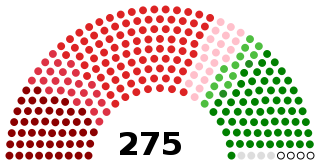
The First Federal Parliament of Nepal, consisting of the House of Representatives and the National Assembly, was elected via the 2017 legislative, provincial and local elections. 165 members were elected via first-past-the-post system and 110 through the proportional representation system to form the 275-member House of Representatives for a five-year term. On 7 February 2018, the provincial electoral colleges, composed of provincial assembly members elected in the provincial elections and chairs and deputy-chairs of local administrative units elected in the local elections, elected eight members each, for a total of 56 elected members, and three more were appointed by the President as nominated by the government, to form the 59 member National Assembly. The National Assembly members drew lots to determine the thirds whose terms would be of two, four and six years respectively. On 23 January 2020, the National Assembly electoral college met for the second time to elect 18 of the 19 Class I members. The House of Representatives was dissolved on 20 December 2020 by President Bidya Devi Bhandari on the request of Prime Minister K.P. Sharma Oli's cabinet. The House was reinstated on 24 February 2021 following a decision by the Supreme Court of Nepal. The House of Representatives was again dissolved on 22 May 2021 by President Bidya Devi Bhandari.














